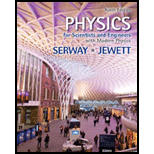
Concept explainers
(a)
The number of carbon atoms in the given sample.
(a)
Answer to Problem 42P
The number of carbon atoms in the given sample is
Explanation of Solution
Write the equation to find the number of carbon atoms.
Here,
Conclusion:
Substitute
Therefore, the number of carbon atoms in the given sample is
(b)
The number of carbon atoms in the given sample.
(b)
Answer to Problem 42P
The number of carbon-14 atoms in the given sample is
Explanation of Solution
Write the equation to find the number of carbon-14 atoms.
Here,
Conclusion:
Substitute
Therefore, the number of carbon-14 atoms in the given sample is
(c)
The decay constant for carbon-14 in inverse seconds.
(c)
Answer to Problem 42P
The decay constant for carbon-14 in inverse seconds is
Explanation of Solution
Write the equation to find the half-life time of carbon-14.
Here,
Conclusion:
Substitute
Therefore, the decay constant for carbon-14 in inverse seconds is
(d)
The number of initial number of decays in a week immediately after the death of species.
(d)
Answer to Problem 42P
The number of initial number of decays in a week immediately after the death of species is
Explanation of Solution
Write the equation to find the decay rate.
Here,
Write the equation to find
Here,
Rewrite the equation for
To find the
Conclusion:
Substitute
Therefore, the number of initial number of decays in a week immediately after the death of species is
(e)
The new number of decays in a week in the current sample.
(e)
Answer to Problem 42P
The new number of decays in a week in the current sample is
Explanation of Solution
Write the equation to find the new number of decays in a week in the current sample.
Here,
Conclusion:
Substitute
Therefore, the new number of decays in a week in the current sample is
(f)
Lifetime of specimen in years using the results from part (c) and (d).
(f)
Answer to Problem 42P
Lifetime of specimen is
Explanation of Solution
Write the equation to find the fraction of decay.
Apply logarithm on both sides.
Rewrite the above equation in terms of
Conclusion:
Substitute
Therefore, the lifetime of specimen is
Want to see more full solutions like this?
Chapter 44 Solutions
Physics for Scientists and Engineers With Modern Physics
- (a) For a spherical capacitor with inner radius a and outer radius b, we have the following for the capacitance. ab C = k₂(b- a) 0.0695 m 0.145 m (8.99 × 10º N · m²/c²)( [0.145 m- 0.0695 m × 10-11 F = PF IIarrow_forwardA pendulum bob A (0.5 kg) is given an initialspeed of vA = 4 m/s when the chord ishorizontal. It then hits a stationary block B (1kg) which then slides to a maximum distanced before it stops. Determine the value of d.The coefficient of static friction between theblock and the plane is μk = 0.2. The coefficientof restitution between A and B is e = 0.8.Ans: d=1.0034 marrow_forwardFigure 29-43 Problem 12. ••13 In Fig. 29-44, point P₁ is at distance R = 13.1 cm on the perpendicular bisector of a straight wire of length L = 18.0 cm carrying current i = 58.2 mA. (Note that the wire is not long.) What is the magnitude of the magnetic field at P₁ due to i? P2° R R Larrow_forward
- Checkpoint 1 The figure shows the current i in a single-loop circuit with a battery B and a resistance R (and wires of neg- ligible resistance). (a) Should the emf arrow at B be drawn pointing leftward or rightward? At points a, B C R b, and c, rank (b) the magnitude of the current, (c) the electric potential, and (d) the electric potential energy of the charge carriers, greatest first.arrow_forwardPls help ASAParrow_forwardPls help asaparrow_forward
- Pls help asaparrow_forward3. If the force of gravity stopped acting on the planets in our solar system, what would happen? a) They would spiral slowly towards the sun. b) They would continue in straight lines tangent to their orbits. c) They would continue to orbit the sun. d) They would fly straight away from the sun. e) They would spiral slowly away from the sun. 4. 1 The free-body diagram of a wagon being pulled along a horizontal surface is best represented by A F N B C 0 Ꭰ FN E a) A b) B c) C app app The app 10 app d) e) ס ח D E 10 apparrow_forwardPls help ASAParrow_forward
 Modern PhysicsPhysicsISBN:9781111794378Author:Raymond A. Serway, Clement J. Moses, Curt A. MoyerPublisher:Cengage Learning
Modern PhysicsPhysicsISBN:9781111794378Author:Raymond A. Serway, Clement J. Moses, Curt A. MoyerPublisher:Cengage Learning Principles of Physics: A Calculus-Based TextPhysicsISBN:9781133104261Author:Raymond A. Serway, John W. JewettPublisher:Cengage Learning
Principles of Physics: A Calculus-Based TextPhysicsISBN:9781133104261Author:Raymond A. Serway, John W. JewettPublisher:Cengage Learning College PhysicsPhysicsISBN:9781938168000Author:Paul Peter Urone, Roger HinrichsPublisher:OpenStax College
College PhysicsPhysicsISBN:9781938168000Author:Paul Peter Urone, Roger HinrichsPublisher:OpenStax College Physics for Scientists and Engineers with Modern ...PhysicsISBN:9781337553292Author:Raymond A. Serway, John W. JewettPublisher:Cengage Learning
Physics for Scientists and Engineers with Modern ...PhysicsISBN:9781337553292Author:Raymond A. Serway, John W. JewettPublisher:Cengage Learning College PhysicsPhysicsISBN:9781305952300Author:Raymond A. Serway, Chris VuillePublisher:Cengage Learning
College PhysicsPhysicsISBN:9781305952300Author:Raymond A. Serway, Chris VuillePublisher:Cengage Learning Glencoe Physics: Principles and Problems, Student...PhysicsISBN:9780078807213Author:Paul W. ZitzewitzPublisher:Glencoe/McGraw-Hill
Glencoe Physics: Principles and Problems, Student...PhysicsISBN:9780078807213Author:Paul W. ZitzewitzPublisher:Glencoe/McGraw-Hill





